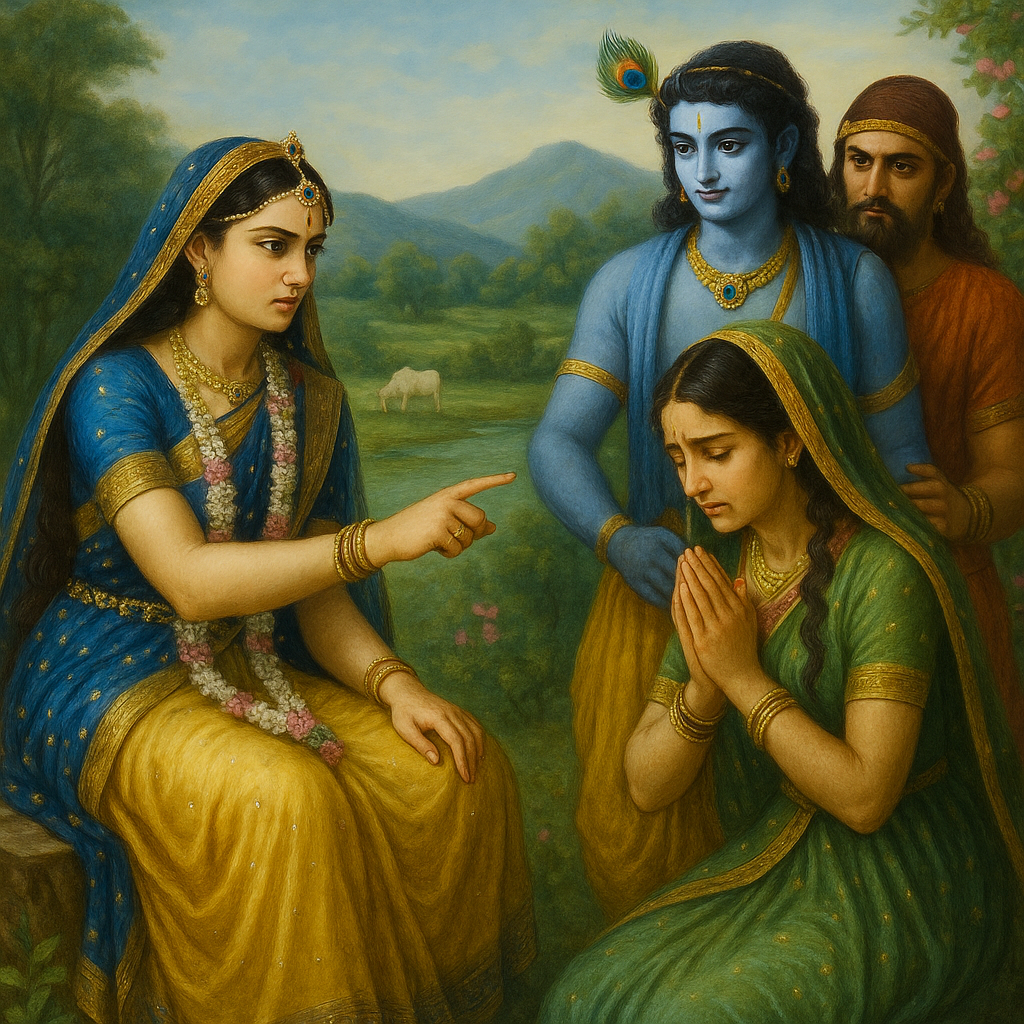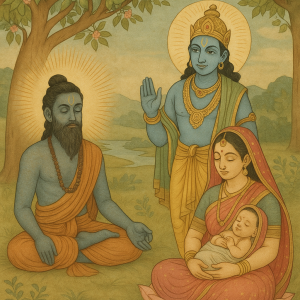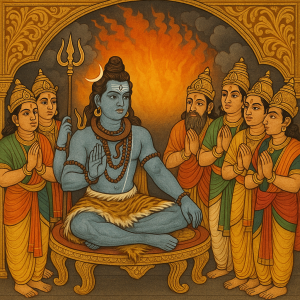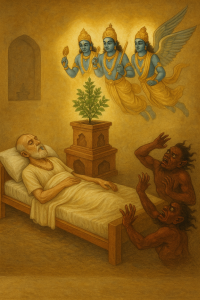The Glorious Past in Goloka Vṛndāvana
Long before her descent into the material world, Tulasī Devī resided in the spiritual world of Goloka Vṛndāvana, the highest planet in the spiritual sky. There, she was a gopī—an eternal associate of Śrīmatī Rādhārāṇī, who is the dearmost beloved of Śrī Kṛṣṇa.
Tulasī was extraordinarily beautiful, talented in dance and singing, and deeply devoted to Kṛṣṇa. However, her heart harbored a special attachment to Him that, though innocent, went beyond the friendly bounds expected by Rādhārāṇī’s sakhīs. Tulasī desired exclusive union with Kṛṣṇa.
As a result, an intense internal conflict grew. One day, Tulasī gazed longingly at Kṛṣṇa and was caught by Rādhārāṇī, who at once discerned her hidden desire. Though Rādhā Devī is the very ocean of compassion, her transcendental jealous love (māna) surged at that moment, and she spoke with gravity:
“Because you have secretly desired my Kṛṣṇa and cast covetous glances upon Him, I curse you to descend to the material world. There you shall be born as a pious and devoted princess, and your desire for union with Kṛṣṇa will be fulfilled—but not in the way you expect.”
Tulasī fell at Rādhā’s feet, weeping. “Please forgive me, O Queen of Vṛndāvana. I never meant to cause offense. Let Your curse become my blessing if it helps me serve You eternally.”
Moved by her submission, Rādhārāṇī added a benediction to her curse: “When your earthly pastimes are over, you will become dear to Viṣṇu and His devotees for all time. You shall be worshiped eternally in the form of a sacred plant, and no offering to Viṣṇu will be complete without your leaves.”
Thus, Tulasī was cursed and blessed in one breath—cast into the world of birth and death, yet chosen for eternal glory as the empress of devotion.
Śaṅkhacūḍa’s Curse and His Role
Meanwhile, in Goloka, Sudāmā, a cowherd boy and associate of Kṛṣṇa, had also offended Rādhārāṇī by mocking Her in jest during a divine play. Though his intent was playful, Rādhā was momentarily displeased and cursed him: “You shall be born on earth as a demon and marry the one who desires Kṛṣṇa in secret.”
Thus, Sudāmā took birth as Śaṅkhacūḍa, and the gopī who was once Tulasī was reborn as Tulasī Devī in the material world. Their destiny was tied together, orchestrated by Kṛṣṇa and Rādhā to teach the world the power of devotion, purity, and surrender.
The Secret of the Amulet and the Boon
Before departing from his heavenly abode, Śaṅkhacūḍa received two special gifts from Lord Brahmā:
- The Sarvamaṅgalamaya Kavaca – an amulet of divine power that rendered him invincible as long as he wore it.
- The boon of protection – that no one could harm him as long as his wife, Tulasī, remained chaste and faithful.
Thus, the secrets to his defeat lay not in brute strength but in mystical arrangements and divine will.
The Lord’s own plan was now moving forward. It would require both the removal of the amulet and the breaking of Tulasī’s chastity—but both had to happen without violating dharma, and without diminishing her glorious devotion.
This setup would culminate in the final battle and the mystical drama that only the Supreme Lord could orchestrate.
Lessons to Be Learned
1. Even the Spiritual World Has Dynamics Beyond Our Understanding
This story reveals that even in Goloka, transcendental personalities like Tulasī and Sudāmā undergo līlās (divine pastimes) that appear like conflict or punishment, but are actually designed to enrich their love and service.
Śrīla Prabhupāda taught that Kṛṣṇa’s pastimes are not subject to material faults. Even curses there are arrangements for greater glory and deeper love.
2. Offense to Devotees Brings Consequence—Even in Play
Sudāmā’s teasing and Tulasī’s glances were not malicious, yet even subtle offenses to great devotees like Rādhārāṇī result in serious outcomes. This underscores the grave importance of avoiding Vaiṣṇava-aparādha.
“The dust from the feet of a devotee is more valuable than all the holy places combined.” – Śrīla Prabhupāda
3. A Curse from a Devotee Can Become the Highest Blessing
Tulasī accepted her curse with humility and surrender. As a result, she was blessed to become eternally worshiped. This teaches that a devotee accepts even misfortune as Kṛṣṇa’s mercy, knowing it leads to purification and deeper bhakti.
4. The Lord Orchestrates Mystical Pastimes to Teach the World
The events that led to Śaṅkhacūḍa and Tulasī’s descent were not accidents. They were deliberate, divinely choreographed teachings. The Lord uses His own eternal associates to play roles in this cosmic drama, all for the benefit of conditioned souls.
5. Chastity Is a Sacred Power in Bhakti Culture
Tulasī’s chastity was not just a personal virtue—it was a shield of protection for her husband and a spiritual force in itself. Śrīla Prabhupāda often highlighted how the chastity and purity of a devoted wife uplifts the entire family, and even influences the spiritual realm.
6. Kṛṣṇa’s Devotees Become Worshipable by All
Though cursed to descend into the material world, Tulasī Devī became the queen of devotional life. No offering to Viṣṇu or Kṛṣṇa is complete without Tulasī leaves, signifying that the Lord raises His devotee above even the demigods.



